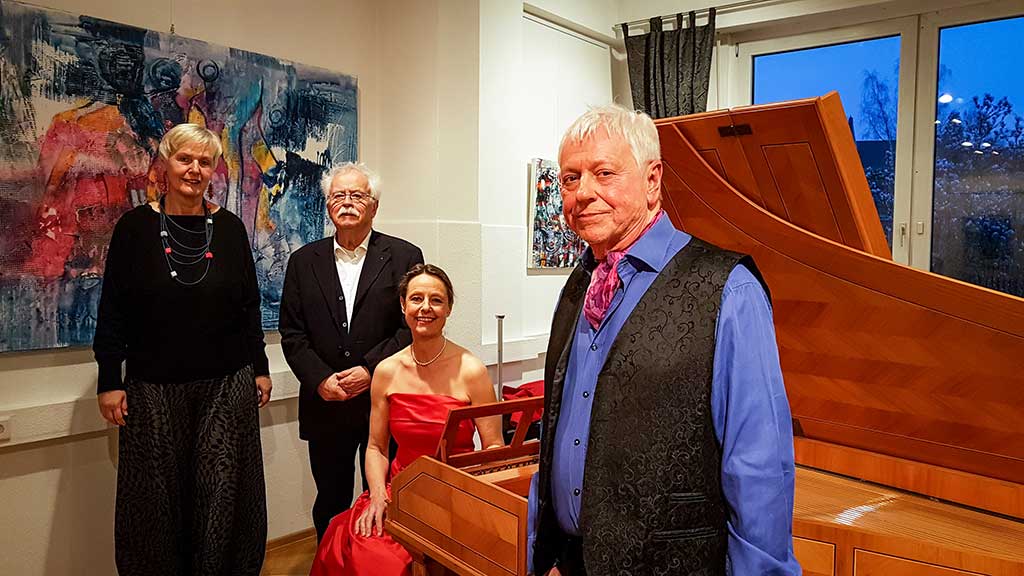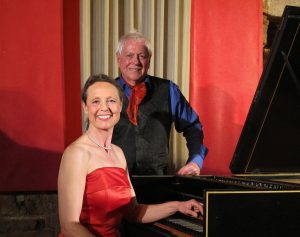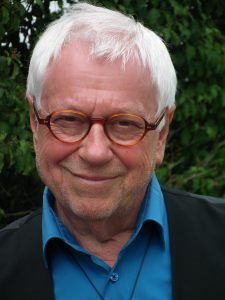f. l. t. r.: Otto von Kotzebue, Urte Lucht, Dieter E. Neuhaus
Photo: Johannes Paqué
ON THE 200TH ANNIVERSARY OF THE DEATH OF AUGUST VON KOTZEBUE
Dear friends of music and literature,
Saturday, March 23, 2019, was the 200th anniversary of the death of the famous poet and dramaturg August von Kotzebue. On this special occasion, the musical-literary duo, consisting of Urte Lucht (fortepiano) and Dieter E. Neuhaus (reading), were guests in the music studio, which put together a highly interesting program with poems and texts by August von Kotzebue as well as contemporary music by the dramatist.
Normally, such a program would have involved an alternating presentation of literature and music, but Lucht and Neuhaus presented a concept that was conceived and choreographed down to the smallest detail, characterized by fluid transitions between music and reading, or a coexistence of both forms. Here it quickly becomes clear that Neuhaus is not only a dramaturge and director but also, and above all, an experienced dramaturg and director. With Lucht, he has the perfect partner at his side who understands, partly with her sensitive play and partly with her temperament, how to maintain a balance between both art forms. Instead of alternating against each other, the audience experienced how both artists synergetically strengthened each other in their statements. Thus the reading almost resembled a theater play, not least because of the excellently worked out characters in Kotzebues texts and poems, which Dieter E. Neuhaus presented to the audience with great persuasive power in harmony with the music. Urte Lucht convinced musically on her fortepiano with a selection of very carefully chosen musical literature, with which she not only created the appropriate ambience, but also understood how to bring the compositions of Kotzebues contemporaries, i.e. Mozart, Beethoven, Schubert and Salieri, noticeably closer to the audience. It should also be mentioned that any music expert who has had the opportunity to try out a fortepiano will quickly realize how demanding this instrument is to play: the keys are so incredibly smooth that a mere strong blast of air can actuate them, which on the one hand enables the interpreter to play very fast, but on the other hand challenges him to the highest degree in the dynamic range between loud and soft, which, as is well known, is the special feature of this instrument as the predecessor of the modern piano. Lucht mastered this not only on the basis of the pieces themselves, but also in direct interaction with Neuhaus’ performance.
Most of the audience experienced August von Kotzebue for the first time that afternoon. More famous than his plays themselves is his murder by the fraternity member and theology student Karl Ludwig Sand. Kotzebue is generally perceived by the general public today as a conservative writer who, despite the spirit of the times, clung to old values and stood up as a declared enemy against the emerging liberalism, which aimed at freedom of the press and a representation of the people. The famous words of Sand which he allegedly screamed during the assassination were: “Here, you traitor to the fatherland!” This brought Sand much veneration at that time and up to today and especially his own death by execution for the murder makes him almost appear as a martyr. The fact that Kotzebue’s famous contemporary and acquaintance Goethe later also expressed himself negatively about Kotzebue’s works seems to confirm the facts.
What is often overlooked, however, is that this movement in Germany was accompanied by a fervent nationalism. A prominent representative of this movement, in which Karl Ludwig Sand participated, was Friedrich Ludwig Jahn (also called “Turnvater Jahn”). The goal of his movement was the national unification of Germany, equal civil rights for all Germans, national education and opportunities for advancement even for children from the lower classes. From today’s point of view, these ideas were quite modern, but they were interspersed with racism (especially against France), anti-Semitism and sexism. Only men were allowed to join this movement. Jews or people converted from Judaism to Christianity were categorically excluded. There is talk of a “Volkstum”, according to which people of one nation share fundamental traits that clearly distinguish them from people of other nations. Jahn condemned the coexistence of different peoples as a “mixture of peoples,” and he denied the “dazzling peoples” any “folk survival”. A famous quotation of Jahn’s is: “Hating everything foreign is the duty of the German”. There is no way around drawing comparisons with the later world view of the National Socialists.
August von Kotzebue, in turn, defended the world order of the time, which envisaged a society of estates and a division of Germany into principalities. In this respect, the criticism regarding his adherence to this conservative world order is certainly true. But at the same time he was someone who gave women an equal role compared to men, and in his plays he married people of all skin colors and all religions in a wild mix. Kotzebue was quite well-disposed toward the French. But this did not mean that he was on Napoleon’s side. On the contrary, Napoleon was also a victim of his satirical attacks and as a publisher he published many anti-Napoleonic writings. He thus presented himself as diametrically opposed to Jahn’s movement, and he publicly expressed his opinion on it with much mockery and malice towards its representatives, which made him a hated target.
It can be stated that Kotzebue did not write plays like Goethe, which are still of great literary conciseness today, which is why he is not so familiar to us today. Nevertheless, in many areas he was a mastermind who addressed topics that are (again) of great topicality today.
With this knowledge, the question arises whether it really makes sense to portray Karl Ludwig Sand, who brutally murdered him in cold blood and in front of Kotzebue’s four-year-old son, as a hero in cultic veneration (as is still the case today), who “liberated the fatherland from the traitor”. The murder of Kotzebue reveals itself more as a murder out of retribution than out of love for the fatherland, since Kotzebue was opposed against the hateful worldview of Sand and Jahn.
However, the reading did not focus on his examination of the “gymnastics movement”. Neuhaus selected texts that placed special emphasis on Kotzebue’s open world view, his self-image as a citizen of the world and his everyday life, which he often explained with great humor. And this was greeted with great emotion, sympathy and goodwill by the numerous and interested audience and above all by our guest of honor, great-great-grandson Otto von Kotzebue. The individual texts were sometimes performed so amusingly that even Urte Lucht could not help but laugh along a few times, although she had of course already known the texts through the many rehearsals.
A phenomenal performance!
Dear friends of music and literature,
For some, the name August von Kotzebue may seem familiar. Born in Weimar in 1761 and killed in Mannheim in 1819, the playwright, writer and librettist was a true great in his day! It was none other than Goethe, who often staged Kotzebue’s works and performed with him on his works on the theater stage. In addition to his literary work, August von Kotzebue also received additional honors.
In 1785 he was raised to the Russian nobility. He lived for some time in Russia, until he returned to Germany in 1817 as consul general on Russian behalf. Von Kotzebue was not a friend of German liberalism and nationalism, which he often expressed through his self-published literary newspaper the Literarische Wochenblatt. Unfortunately, he made himself many enemies, especially the fraternities, which finally became his fate. On March 23, 1819, the fraternity member and theology student Karl Ludwig Sand broke into the former residence of Kotzebue in Mannheim and stabbed him in front of his 4-year-old son, while he said: “Here, you traitor of the Fatherland!”
This evening is dedicated to this special person and what could be better than a reading with stories by August von Kotzebues while being accompanied by classical music.
Dieter E. Neuhaus can already look back on a remarkable career as a staging director of various operas and plays. His 25 open-air theater projects on the occasion of historical events, which he staged together with the citizens of the respective city or region, are also particularly special. In addition, he appeared in more than 500 theater productions as an actor. Between 1975 and 1978 he was also a dramaturg at the theater of Bonn.
Urte Lucht takes over the musical arrangement of this evening with composers, who may well have been known by von Kotzebue. The program includes works by W. A. Mozart, F. Schubert and L. v. Beethoven. Incidentally, it is known that August von Kotzebue stood even in contact with Beethoven! Urte Lucht studied both the harpsichord and the pianoforte (among others with the world-famous Gustav Leonhardt) and she can now call several international awards her own.
Together, the two artists form a very special duo of literature and music!
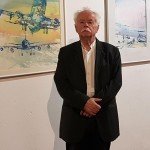 On this occasion, we will also find a guest of honor in our midst: Otto von Kotzebue! The great-great-grandson of the deceased, who lives in Munich, is a painter and has often been seen in our gallery. In his many travels he crossed many countries, ia. the United States and Russia, whose impressions are immortalized in his impressionistic paintings. More about Otto von Kotzebue can be found here.
On this occasion, we will also find a guest of honor in our midst: Otto von Kotzebue! The great-great-grandson of the deceased, who lives in Munich, is a painter and has often been seen in our gallery. In his many travels he crossed many countries, ia. the United States and Russia, whose impressions are immortalized in his impressionistic paintings. More about Otto von Kotzebue can be found here.
Saturday, 23rd of March 2019
5 pm
Blücherstraße 14
53115 Bonn
PROGRAM:
“Dwarfs remain dwarves, even if they sit on the Alps …!”
Literary-theatrical and musical encounters with the poet August von Kotzebue,
who was stabbed by a student on March 23, 1819 in Mannheim
designed by Urte Lucht (Hammerklavier)
and Dieter E. Neuhaus (voice)
Reading (in German)
– “Ein guter Mord, ein echter Mord…“
Gerichtsdiener in „Woyzeck“ von Georg Büchner
– „Ermordung des russischen Staatsraths August von Kotzebue…“
Erinnerungsblätter für gebildete Leser aus allen Ständen am 4. April 1819
– „Zwischenbemerkungen: „1761 bis 1819 ist eine Lebenszeit….“
– Kotzebues „Ausbruch der Verzweiflung“
Gedicht
– Zwischenbemerkung: „Koetzebue, ein Diener von Kaisern, Zaren, Fürsten…..“
– Kotzebues „Gebet um Dummheit“
Gedicht
– Zwischenbemerkung: „Kotzebues Städte – Ein Leben in Europa…“
– Kotzebues Alltag
Erinnerungen
– Zwischenbemerkung: „Kotzebues Ehen – Ein Leben in der Familie.“
– Kotzebues Moral „Der Schiffer“
Gedicht
– August von Kotzebue – Homme de Theatre: „Sein Debut als Schauspieler“
Erinnerungen
– Zwischenbemerkung: „Kotzebue am Theater in der ganzen Welt….“
– Kotzebues „Gedanken eines Bauern beim Guckkasten (Schauspieltheater)“
Gedicht
– Zwischenbemerkung: „Kotzebues Welttheater – Seine Lust- und Schauspiele“
– Kotzebues „Ansichten und Einsichten“
Gedanken
– Zwischenbemerkung: „August von Kotzebue – Ein Kämpfer gegen die Zeitenwende…“
– Johann Wolfgang Goethes Kotzebue-Verachtung
Wartburgfest-Gedicht
– „Zufälliges Eintreffen einer Prophezeihung”
Erinnerungsblätter für gebildete Leser aus alle Ständen am 18. Apriln 1819
– „Carl Ludwig Sand“
Nachricht
– „Sands letzter Wille“
Anzeige
– August von Kotzebues eigener, von ihm selbst verfasster Nachruf
– Kotzebue-Vermächtnis „Es kann ja nicht immer so bleiben…“
Gedicht
Music
Franz Schubert (1797 – 1828)
Impromptu As-Dur (Allegretto) opus posth.142
Wolfgang Amadeus Mozart (1756 – 1791)
Deutsche Tänze KV 509
Präludium C-Dur KV 394
Rondo D-Dur (Allegro) KV 485
Ludwig van Beethoven (1770 – 1827)
Variationen über „Tändeln und Scherzen“ von F.X. Süssmayr WoO 76
Wolfgang Amadeus Mozart (1756 – 1791)
Adagio für Glasharmonika KV 356
Franz Schubert (1797 – 1828)
Impromptu B-Dur (Andante) opus posth.142
Antonio Salieri (1750 – 1825)
Sonata C-Dur, 4.Satz (Allegro)
The Kotzebue texts can be found in publications from the years 1780 to 1822 and are on microfilm of the University Library Freiburg i.Br. read.
Entry: 18,- € / 10,- € red.
Urte Lucht
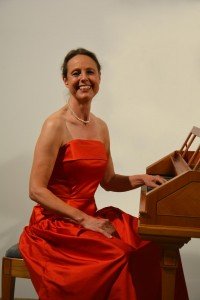
Fotografin: Juliane Fuchs
At the age of four, Urte Lucht began to play the harpsichord. As a teenager, she attended master classes for harpsichord, fortepiano and chamber music with Gustav Leonhardt, Jos van Immerseel and Nikolaus Harnoncourt. After studying in Hamburg, Zurich (with Johann Sonnleitner) and Basel at the Schola Cantorum Basiliensis (with Jesper Christensen), she began her busy concert career both on the harpsichord and the fortepiano. International prizes, radio, television and CD recordings followed.
Urte Lucht performs at major festivals such as Schleswig Holstein Music Festival, Baroque Festival Arolsen, Days of Old Music Regensburg, Lake Constance Festival, European Weeks Passau, Landshut Court Music Days. She has performed with Maria Cristina Kiehr, Simone Kermes, Constanze Backes, Andrea Bischoff, Stefan Fuchs (Ensemble Trazom), Leila Schayegh and Frieder Bernius. In addition to the historically informed performance practice, Urte Lucht has a keen interest in New Music, as evidenced by several premieres and world premieres, including works by Josef Tals and Erhan Sanris. She is often heard on Swiss radio SRF as a subject matter expert in the program “Disco” and is also co-founder of the Ettenheim Music Summer, the renowned concert series for early music in the baroque town of Ettenheim.
Since 2007 Urte Lucht teaches at the Staatliche Hochschule für Musik Karlsruhe. From 2000 – 2003 she was a lecturer at the International Spring Academy for Early Music in Stift Geras, Austria, and in 2005 taught at the International Summer Courses in Bietigheim Castle.
Dieter E. Neuhaus – director, author, actor
Dieter E. Neuhaus worked between 1972 and 1985 at the theaters in Schleswig, Lucerne, Bonn and Freiburg i. Br.. Since then he works as a freelancer. He has directed operas (including “Dido and Aeneas” by Purcell, “Orpheus and Eurydice” by Gluck) and drama projects (including bilingual staging with young actors from France and Germany).
Of particular importance to him are the 25 open-air theater projects, where he often worked with the people of the respective city or region on the occasion of a historic event: i.a. “The Festival Sempach” (Canton of Lucerne / Switzerland – 1986), “The Weiden City Spectacle” (Upper Palatinate – 1992), “The Offenburg Festival of Freedom” (1997), “The Millennium Rush in Brauweiler” (Pulheim – 1999), City – Land – River: Kehl 2010″ and “The Emmendinger 600 Year Market Game ” (2018).
As an actor, he has designed in over 500 appearances in Germany, Switzerland, Austria, the Netherlands, radio stations of those respective countries texts by Boccaccio, Grimmelshausen, Hölderlin, Goethe, Hans Christian Andersen and Mark Twain and together with musicians poems of the Baroque, Expressionism, the “Bild” newspaper and “The Ring of the Nibelung by Richard Wagner in 98 minutes”. “Come comfort of the night, o nightingale” is the title of the first joint program with Urte Lucht: music and poetry from the Baroque period.
I’m looking forward to your visit!
Sincerely
Gabriele Paqué
Note on parking!
Parking spots in Bonn-Poppelsdorf, about a 10 minutes walk from the Blücherstraße!
Current exhibition by Lucia Hinz: Dance of Colors
The gallery is open on Saturdays from 2 – 6 pm.
By appointment, the exhibition can also be visited at other times.
Blücherstr. 14, 53115 Bonn
Telefon: 0228-41076755
